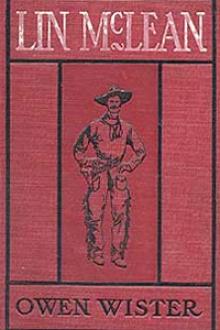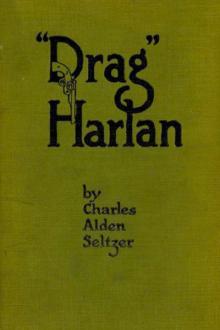The Jimmyjohn Boss, and Other Stories, Owen Wister [easy novels to read txt] 📗

- Author: Owen Wister
Book online «The Jimmyjohn Boss, and Other Stories, Owen Wister [easy novels to read txt] 📗». Author Owen Wister
“He's missed her!” cried McLean, again. “She's savin' herself.”
But the man's figure did not appear in pursuit. Instead of this, the woman returned as quickly as she had gone, and entered the dark interior.
“She had something,” said Wiggin. “What would that be?”
“Maybe it's all right, after all,” said McLean. “She went out to get wood.”
The rough steepness of our trail had brought us down to a walk, and as we continued to press forward at this pace as fast as we could, we compared a few notes. McLean did not think he saw any flash. Wiggin thought that he had heard a sound, but it was at the moment when the Virginian's horse had noisily started away.
Our trail had now taken us down where we could no longer look across and see the cabin. And the half-mile proved a long one over this ground. At length we reached and crossed the rocky ford, overtaking the Virginian there.
“These hawsses,” said he, “are played out. We'll climb up to camp afoot. And just keep behind me for the present.”
We obeyed our natural leader, and made ready for whatever we might be going into. We passed up the steep bank and came again in sight of the door. It was still wide open. We stood, and felt a sort of silence which the approach of two new-comers could not break. They joined us. They had been coming home from hunting, and had plainly heard a shot here. We stood for a moment more after learning this, and then one of the men called out the names of Hank and Willomene. Again we—or I at least—felt that same silence, which to my disturbed imagination seemed to be rising round us as mists rise from water.
“There's nobody in there,” stated the Virginian. “Nobody that's alive,” he added. And he crossed the cabin and walked into the door.
Though he made no gesture, I saw astonishment pass through his body, as he stopped still; and all of us came after him. There hung the crucifix, with a round hole through the middle of it. One of the men went to it and took it down; and behind it, sunk in the log, was the bullet. The cabin was but a single room, and every object that it contained could be seen at a glance; nor was there hiding-room for anything. On the floor lay the axe from the wood-pile; but I will not tell of its appearance. So he had shot her crucifix, her Rock of Ages, the thing which enabled her to bear her life, and that lifted her above life; and she—but there was the axe to show what she had done then. Was this cabin really empty? I looked more slowly about, half dreading to find that I had overlooked something. But it was as the Virginian had said; nobody was there.
As we were wondering, there was a noise above our heads, and I was not the only one who started and stared. It was the parrot; and we stood away in a circle, looking up at his cage. Crouching flat on the floor of the cage, his wings huddled tight to his body, he was swinging his head from side to side; and when he saw that we watched him, he began a low croaking and monotonous utterance, which never changed, but remained rapid and continuous. I heard McLean whisper to the Virginian, “You bet he knows.”
The Virginian stepped to the door, and then he bent to the gravel and beckoned us to come and see. Among the recent footprints at the threshold the man's boot-heel was plain, as well as the woman's broad tread. But while the man's steps led into the cabin, they did not lead away from it. We tracked his course just as we had seen it through the glasses: up the hill from the brush to the window, and then to the door. But he had never walked out again. Yet in the cabin he was not; we tore up the half-floor that it had. There was no use to dig in the earth. And all the while that we were at this search the parrot remained crouched in the bottom of his cage, his black eye fixed upon our movements.
“She has carried him,” said the Virginian. “We must follow up Willomene.”
The latest heavy set of footprints led us from the door along the ditch, where they sank deep in the softer soil; then they turned off sharply into the mountains.
“This is the cut-off trail,” said McLean to me. “The same he brought her in by.”
The tracks were very clear, and evidently had been made by a person moving slowly. Whatever theories our various minds were now shaping, no one spoke a word to his neighbor, but we went along with a hush over us.
After some walking, Wiggin suddenly stopped and pointed.
We had come to the edge of the timber, where a narrow black canyon began, and ahead of us the trail drew near a slanting ledge, where the footing was of small loose stones. I recognized the odor, the volcanic whiff, that so often prowls and meets one in the lonely woods of that region, but at first I failed to make out what had set us all running.
“Is he looking down into the hole himself?” some one asked; and then I did see a figure, the figure I had looked at through the glasses, leaning strangely over the edge of Pitchstone Canyon, as if indeed he was peering to watch what might be in the bottom.
We came near. But those eyes were sightless, and in the skull the story of the axe was carved. By a piece of his clothing he was hooked in the twisted roots of a dead tree, and hung there at the extreme verge. I went to look over, and Lin McLean caught me as I staggered at the sight I saw. He would have lost his own foothold in saving me had not one of the others held him from above.
She was there below; Hank's woman, brought from Austria to the New World. The vision of that brown bundle lying in the water will never leave me, I think. She had carried the body to this point; but had she intended this end? Or was some part of it an accident? Had she meant to take him with her? Had she meant to stay behind herself? No word came from these dead to answer us. But as we stood speaking there, a giant puff of breath rose up to us between the black walls.
“There's that fluffy sigh I told yu' about,” said the Virginian.
“He's talkin' to her! I tell yu' he's talkin' to her!” burst out McLean, suddenly, in such a voice that we stared as he pointed at the man in the tree. “See him lean over! He's sayin', 'I have yu' beat after all.'” And McLean fell to whimpering.
Wiggin took the boy's arm kindly and walked him along the trail. He did not seem twenty yet. Life had not shown this side of itself to him so plainly before.
“Let's get out of here,” said the Virginian.
It seemed one more pitiful straw that the lonely bundle should be left in such a vault of doom, with no last touches of care from its fellow-beings, and no heap of kind earth to hide it. But whether the place is deadly or





Comments (0)